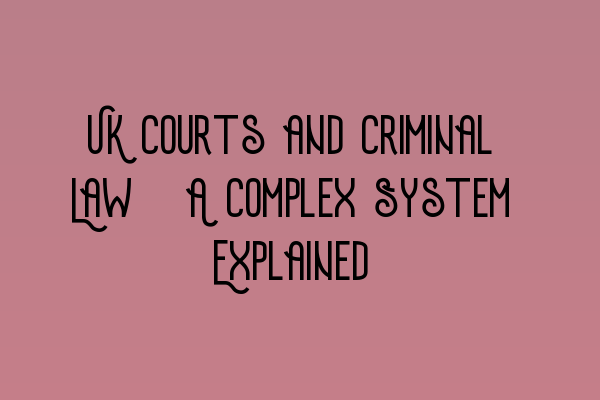UK Courts and Criminal Law: A Complex System Explained
When it comes to understanding the intricacies of the UK legal system, particularly in terms of criminal law, it can seem like navigating a maze. With its multiple courts, diverse procedures, and ever-evolving legislation, it can be challenging to grasp how it all works. However, gaining a basic understanding of the system is essential for anyone interested in criminal law and practice in the UK.

The Hierarchy of UK Courts
The UK legal system is structured as a hierarchical system of courts, with each court having its own jurisdiction and powers. At the top of the hierarchy is the Supreme Court, followed by the Court of Appeal, the High Court, and the Crown Court. Beneath these courts are the Magistrates’ Courts and the Youth Courts.
The Supreme Court is the highest court in the UK and is primarily an appellate court. It handles cases of constitutional importance, as well as civil and criminal appeals from lower courts. Below the Supreme Court, the Court of Appeal hears appeals from the Crown Court and the High Court.
The High Court is divided into three divisions: the Queen’s Bench Division, the Chancery Division, and the Family Division. The Queen’s Bench Division deals with a wide range of cases, including contract disputes, personal injury claims, and judicial reviews. The Chancery Division primarily handles matters related to business and property law, while the Family Division deals with family law cases such as divorce and child custody.
The Crown Court has jurisdiction over serious criminal cases, such as murder, rape, and drug offenses. It also hears appeals from the Magistrates’ Courts and deals with cases referred to it by the lower courts.
The Role of Magistrates’ Courts and Youth Courts
Magistrates’ Courts are the lower courts in the criminal justice system. They handle less serious criminal cases, such as minor assaults, theft, and traffic offenses. Magistrates, who are often volunteers with some legal training, preside over these courts. They can impose custodial sentences of up to six months and fines of up to £5,000.
As for Youth Courts, they deal specifically with cases involving defendants aged between 10 and 17. The youth justice system aims to rehabilitate young offenders rather than solely focusing on punishment. Youth Courts have different procedures to ensure the welfare and best interests of young defendants are taken into account.
Procedure in the UK Criminal Courts
The criminal justice system in the UK follows a defined procedure to ensure fairness and due process. It begins with an investigation by the police, who gather evidence and present it to the Crown Prosecution Service (CPS). The CPS then determines whether there is sufficient evidence to bring a case to court.
If the CPS decides to proceed, the case will be brought before a Magistrates’ Court for the initial hearing. At this stage, the defendant can enter a plea of guilty or not guilty. If they plead guilty, the case proceeds to sentencing. If they plead not guilty, the case will be sent to the Crown Court for trial.
In the Crown Court, a judge and jury hear evidence from both the prosecution and the defense. The jury then deliberates and reaches a verdict. If the defendant is found guilty, the judge will impose a sentence based on the seriousness of the offense and other relevant factors.
Studying Criminal Law and Practice in the UK
For aspiring legal professionals, understanding the intricacies of the UK courts and criminal law is crucial. Proper education and training are essential to navigate this complex system effectively. The Solicitors Qualifying Examination (SQE) offers a pathway to become a qualified solicitor in the UK.
At SQE Criminal Law & Practice Law UK, we provide comprehensive preparation courses for the SQE exams. Our courses cover all aspects of criminal law, including the structure of the UK courts, procedure, evidence, and sentencing. We also offer practice exams and mocks to help you refine your knowledge and skills.
Whether you’re preparing for SQE 1 or SQE 2, our courses are designed to equip you with the necessary knowledge and expertise to succeed. Don’t let the complexity of the UK legal system intimidate you – with the right guidance and preparation, you can achieve your career goals in criminal law.
Get started on your journey to becoming a criminal law expert by enrolling in our SQE 1 Practice Mocks FLK1 FLK2 or SQE 2 Preparation Courses today. Don’t miss out on crucial exam dates – check out the SRA SQE Exam Dates and plan your study schedule accordingly.
